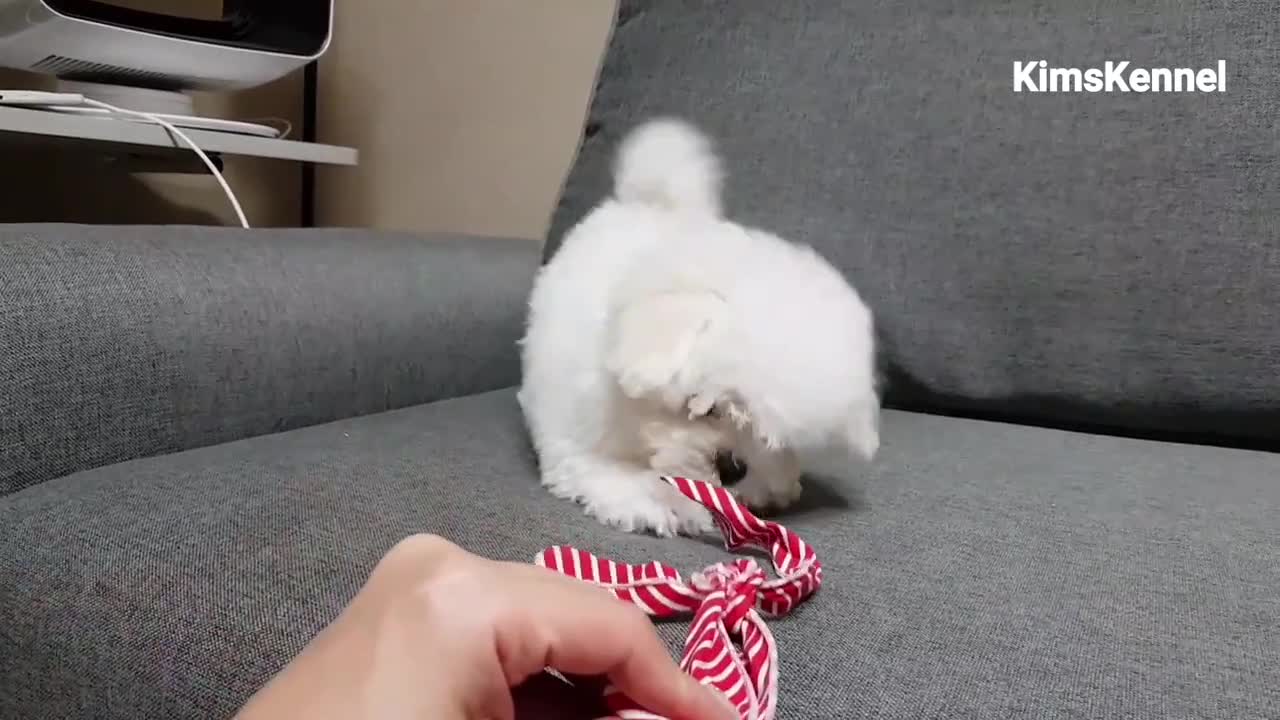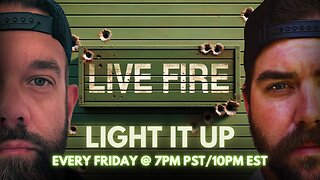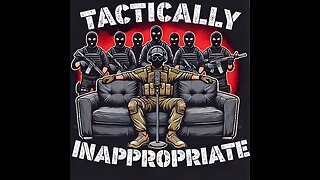Premium Only Content

Puppy play time teacup bichon frise
How to train your small puppy at house?
House-training your dog or puppy requires patience, commitment and lots of consistency. Accidents are part of the process, but if you follow these basic house-training guidelines, you can get the newest member of your family on the right track.
Establish a routine
Puppies do best on a regular schedule. The schedule teaches them that there are times to eat, times to play and times to do their business. Typically, a puppy can control their bladder one hour for every month of age. So if your puppy is 2 months old, they can hold it for about two hours. Don't go longer than this between bathroom breaks or they’re likely to have an accident.
Take your puppy outside frequently—at least every two hours—and immediately after they wake up, during and after playing, and after eating or drinking.
Pick a bathroom spot outside, and always take your puppy (on a leash) to that spot. While your puppy is relieving themselves, use a specific word or phrase that you can eventually use before they go to remind them what to do. Take them out for a longer walk or some playtime only after they have eliminated.
Reward your puppy every time they eliminate outdoors. Praise or give treats—but remember to do so immediately after they’ve finished, not after they come back inside. This step is vital, because rewarding your dog for going outdoors is the only way to teach what's expected of them. Before rewarding, be sure they’re finished. Puppies are easily distracted and if you praise too soon, they may forget to finish until they’re back in the house.
Put your puppy on a regular feeding schedule. What goes into a puppy on a schedule comes out of a puppy on a schedule. Depending on their age, puppies may need to be fed two or three times a day. Feeding your puppy at the same times each day will make it more likely that they'll eliminate at consistent times as well, making house-training easier for both of you.
Pick up your puppy's water dish about two and a half hours before bedtime to reduce the likelihood that they'll need to relieve themselves during the night. Most puppies can sleep for approximately seven hours without needing a bathroom break. If your puppy does wake you up in the night, don't make a big deal of it; otherwise, they will think it is time to play and won't want to go back to sleep. Turn on as few lights as possible, don't talk to or play with your puppy, take them out to the spot where they relieve themselves and then return them to bed.
Supervise your puppy
Don't give your puppy an opportunity to soil in the house; keep an eye on them whenever they’re indoors.
Tether your puppy to you or a nearby piece of furniture with a six-foot leash if you are not actively training or playing. Watch for signs that your puppy needs to go out. Some signs are obvious, such as barking or scratching at the door, squatting, restlessness, sniffing around or circling. When you see these signs, immediately grab the leash and take them outside to their bathroom spot. If they eliminate, praise them and reward with a treat.
Keep your puppy on leash in the yard. During the house-training process, your yard should be treated like any other room in your house. Give your puppy some freedom in the house and yard only after they become reliably house-trained.
-
 1:44:12
1:44:12
Roseanne Barr
11 hours ago $15.24 earnedSquid Game? | The Roseanne Barr Podcast #81
86.3K154 -
 1:13:27
1:13:27
Man in America
16 hours ago🚨 2025 WARNING: Disaster Expert Predicts 'ABSOLUTE CHAOS' for America
59.2K43 -
 3:43:16
3:43:16
I_Came_With_Fire_Podcast
17 hours agoNew Years TERRORISM, Mexico trying to FAFO, and DARK MONEY to US Think Tanks
26.2K11 -
 1:47:40
1:47:40
Glenn Greenwald
14 hours agoThe Key Issues Determining the Trajectory of the Second Trump Administration: From Israel and Ukraine to Populism and Free Speech | SYSTEM UPDATE #382
78K50 -
 1:02:44
1:02:44
The StoneZONE with Roger Stone
11 hours agoRoger Stone Unveils His 16th Annual International Best and Worst Dressed List | The StoneZONE
37.3K5 -
 45:22
45:22
Kyle Rittenhouse Presents: Tactically Inappropriate
13 hours ago $3.94 earnedKyle Rittenhouse Presents: Tactically Inappropriate
36.1K19 -
 1:13:16
1:13:16
Patriots With Grit
12 hours agoThe Comedy of White Privilege & Government | A.J. Rice
27.2K3 -
 49:40
49:40
Havoc
16 hours agoWhat's 2025 Looking Like... | Stuck Off the Realness Ep. 23
45.2K4 -
 3:58:11
3:58:11
Nerdrotic
16 hours ago $38.05 earnedWOKE Hollywood Freak out, Cyber Truck Attack, 2025 BEGINS! | Friday Night Tights 335 w Benny Johnson
107K35 -
 25:07
25:07
Adam Does Movies
14 hours ago $0.93 earnedTOP 10 BEST MOVIES OF 2024!
19.5K2